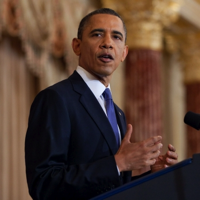When President Barack Obama took the podium at the State Department to outline Washington's new policy framework for the Middle East several weeks ago, he unleashed a storm of controversy that caught many people by surprise. The speech sought to outline a new American stance toward the unfolding changes in the Arab world. But the controversy centered instead on the president's statement regarding the decades-old conflict between Israelis and Palestinians.
When Obama called for a return to negotiations "based on the 1967 lines with mutually agreed swaps," he sparked a furious, if rather unusual dispute. On one side, the president's critics declared that Obama had made a dramatic change in U.S. policy. On the other, his supporters said he had simply restated a longstanding approach to the peace process embraced by a series of U.S. administrations long before Obama came to office.
Only moments after the speech ended, Israeli Prime Minister Benjamin Netanyahu characterized Obama's proposal as a threat to Israel's survival. "Israel believes that for peace to endure between Israelis and Palestinians," he said pointedly, "the viability of a Palestinian state cannot come at the expense of the viability of the one and only Jewish state."

